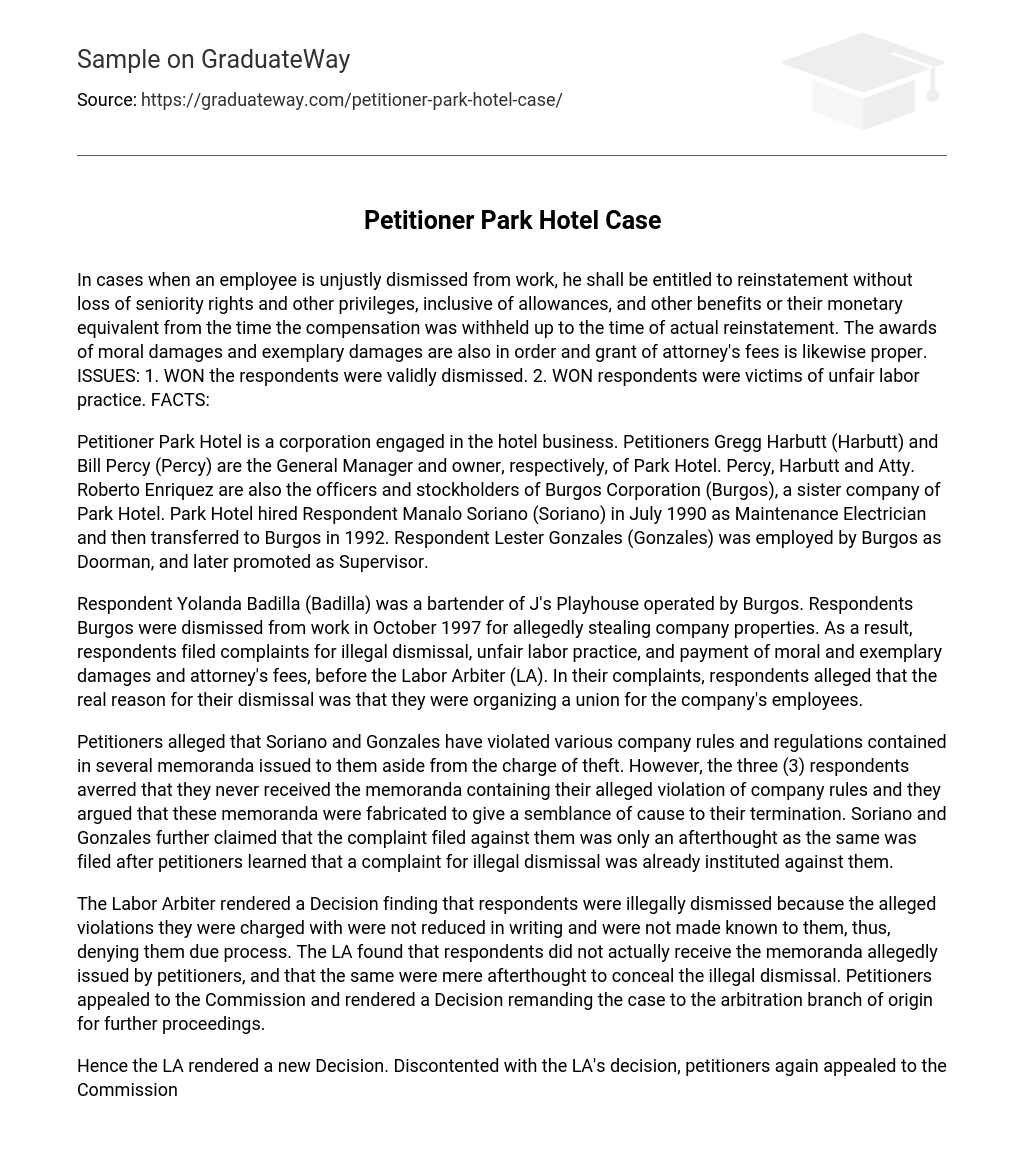If an employee is unfairly terminated, they have the right to be reinstated with all their seniority rights, privileges, allowances, benefits and equivalent monetary value from the time their compensation was withheld until actual reinstatement. Furthermore, they may receive moral damages and exemplary damages, and attorney’s fees may also be granted. The key matters to consider are whether the respondents were lawfully dismissed and if they experienced unfair labor practices. Here are the case’s facts:
Petitioner Park Hotel is a corporation engaged in the hotel business. Petitioner Gregg Harbutt is the General Manager of Park Hotel and petitioner Bill Percy is the owner of the hotel. Both Harbutt and Percy are also officers and stockholders of Burgos Corporation, a sister company of Park Hotel. Respondent Manalo Soriano was hired by Park Hotel in July 1990 as a Maintenance Electrician and later transferred to Burgos in 1992. Respondent Lester Gonzales was employed by Burgos as a Doorman and subsequently promoted to Supervisor.
Respondent Yolanda Badilla (Badilla) worked as a bartender at J’s Playhouse, which was operated by Burgos. Respondents Burgos were terminated from their positions in October 1997, accused of stealing company assets. Consequently, the respondents filed complaints with the Labor Arbiter (LA), demanding compensation for unlawful dismissal, unfair labor practices, as well as compensation for moral and exemplary damages, and attorney’s fees. Throughout their complaints, they claimed that the true motive behind their termination was their efforts to organize a union for the company’s staff.
Petitioners claimed that Soriano and Gonzales had violated multiple company rules and regulations as stated in various memoranda. In addition to the theft charge, these memoranda served as evidence of their alleged violations. However, the three respondents argued that they were never provided with the mentioned memoranda regarding their supposed breaches of company regulations. They believed that these memoranda were fabricated to justify their termination. Soriano and Gonzales also contended that the complaint filed against them was an afterthought since it was submitted following the initiation of a complaint for illegal dismissal against petitioners.
The Labor Arbiter found that the respondents’ termination was unlawful because there were no written documentation or communication of charges, thus violating their right to due process. Furthermore, it was revealed that the respondents did not receive any memoranda from the petitioners, indicating that these documents were possibly forged to hide the illegal termination. The Commission received an appeal from the petitioners regarding this ruling and sent the case back to the original arbitration branch for additional proceedings.
As a result, the LA issued a new Decision that was later affirmed by the Commission and dismissed the appeal for lacking merit. The motion for reconsideration filed by Petitioners was also denied due to lack of merit. Following this, Petitioners filed a petition for certiorari with the CA, alleging that the Commission had committed grave abuse of discretion in holding Park Hotel, Harbutt and Percy jointly and severally liable to respondents.
CA upheld the Commission’s ruling but made some changes. To have a valid dismissal, two conditions must be met: (a) the employee is given an opportunity to present their case and defend themselves; and (b) the reason for dismissal is justified under Article 282 of the Labor Code or any authorized causes specified in Articles 283 and 284 of the same Code.
In this case, both mentioned elements are missing. The respondents were terminated without a valid reason and without being granted an opportunity to present their side or defend themselves. In situations of unjust termination, employees retain the right to be reinstated to their former position with no loss of seniority rights or privileges, including monetary allowances and benefits. This applies from the time when their compensation was withheld until they are actually reinstated.
The Court has decided to offer separation pay rather than reinstatement due to the significant amount of time that has passed since the respondents were terminated. The respondents are entitled to receive their full backwages, including allowances and other benefits, or an equivalent monetary compensation. Instead of being reinstated, they should be given separation pay equivalent to one month’s salary for each year of service. It is important to emphasize that granting separation pay and backwages can both be awarded to the respondents; these are not mutually exclusive options. Additionally, the Court finds it appropriate to award moral and exemplary damages to the respondents.
Moral damages may be claimed if an employee’s termination is marked by bad faith, fraud, or oppressive conduct that contradicts morals, good customs, or public policy. In contrast, exemplary damages are only applicable if the dismissal was carried out in a reckless, oppressive, or malicious manner. Moreover, granting attorney’s fees is suitable as well. Respondents who were unjustly terminated and compelled to pursue legal action or bear expenses to safeguard their rights because of the defendants’ oppressive behavior may be granted attorney’s fees.
The respondents have decided to take legal action against the petitioners in order to safeguard their rights and interests. The basis for this decision lies in the unfair actions committed by the petitioners. Furthermore, according to Article 248 (a) of the Labor Code, unfair labor practice is described as any employer interference, restraint, or coercion that impedes employees’ right to self-organization or forming an association.
As per the Labor Code, an employer’s unfair labor practice requires substantial evidence that is relevant and convincing to a reasonable person. In this case, the employees were terminated suddenly upon expressing their desire to establish and join a union.





